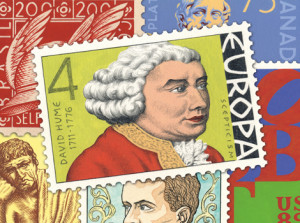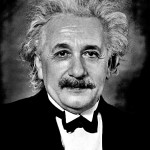The Scottish thinker David Hume wanted to bring philosophy to its senses. He scoffed at so-called human reason. Like John L ocke, Hume believed that people knew of the world began with the senses. He set out to discover whether there was any real proof of those things that people took for granted. Hume’s questioning of God’s existence might have cost him his life a century or so earlier. it still caused a public scandal. This may be why he said: “Errors in religion are dangerous, those in philosophy only ridiculous.”
ocke, Hume believed that people knew of the world began with the senses. He set out to discover whether there was any real proof of those things that people took for granted. Hume’s questioning of God’s existence might have cost him his life a century or so earlier. it still caused a public scandal. This may be why he said: “Errors in religion are dangerous, those in philosophy only ridiculous.”
 ocke, Hume believed that people knew of the world began with the senses. He set out to discover whether there was any real proof of those things that people took for granted. Hume’s questioning of God’s existence might have cost him his life a century or so earlier. it still caused a public scandal. This may be why he said: “Errors in religion are dangerous, those in philosophy only ridiculous.”
ocke, Hume believed that people knew of the world began with the senses. He set out to discover whether there was any real proof of those things that people took for granted. Hume’s questioning of God’s existence might have cost him his life a century or so earlier. it still caused a public scandal. This may be why he said: “Errors in religion are dangerous, those in philosophy only ridiculous.”
Hume said all knowledge boiled down on two sources — impressions and ideas. Impressions are direct experiences, whereas ideas are just memories of impressions. the brain can sort and combine ideas into complex creations that do not exist in reality. For example, the idea of mermaid combines the impressions “fish”and “woman”. He also challenged accepted scientific laws, such as gravity and cause and effect. His view was that they are accepted in the same way that someone who has only ever seen brown cows thinks all cows are brown.
Hume made no secret of the fact that his ultimate ambition was literary fame and ambition. And so he was a little miffed when his first book, “A Treatise of Human Nature,” went unnoticed. It was history, not philosophy, that brought him success. Hume’s “History of England” was a bestseller. He made a lot of money from book sales. The university later rejected Hume as a lecturer because he questioned God’s existence but he was welcomed in France, where his made him a huge success.
 In France he became friend with the philosopher Rousseau but they later fell out. The economist Adam Smith was Hume’s closest friend. They shared similar views, such as a belief that free trade between nations is of mutual benefit. Albert Einstein named Hume as a major influence when he came up with his theory of relativity.
In France he became friend with the philosopher Rousseau but they later fell out. The economist Adam Smith was Hume’s closest friend. They shared similar views, such as a belief that free trade between nations is of mutual benefit. Albert Einstein named Hume as a major influence when he came up with his theory of relativity.